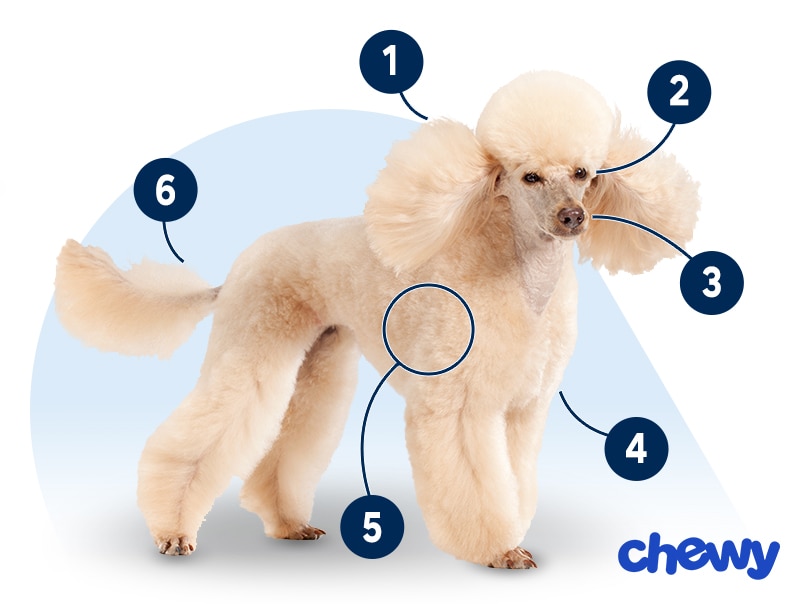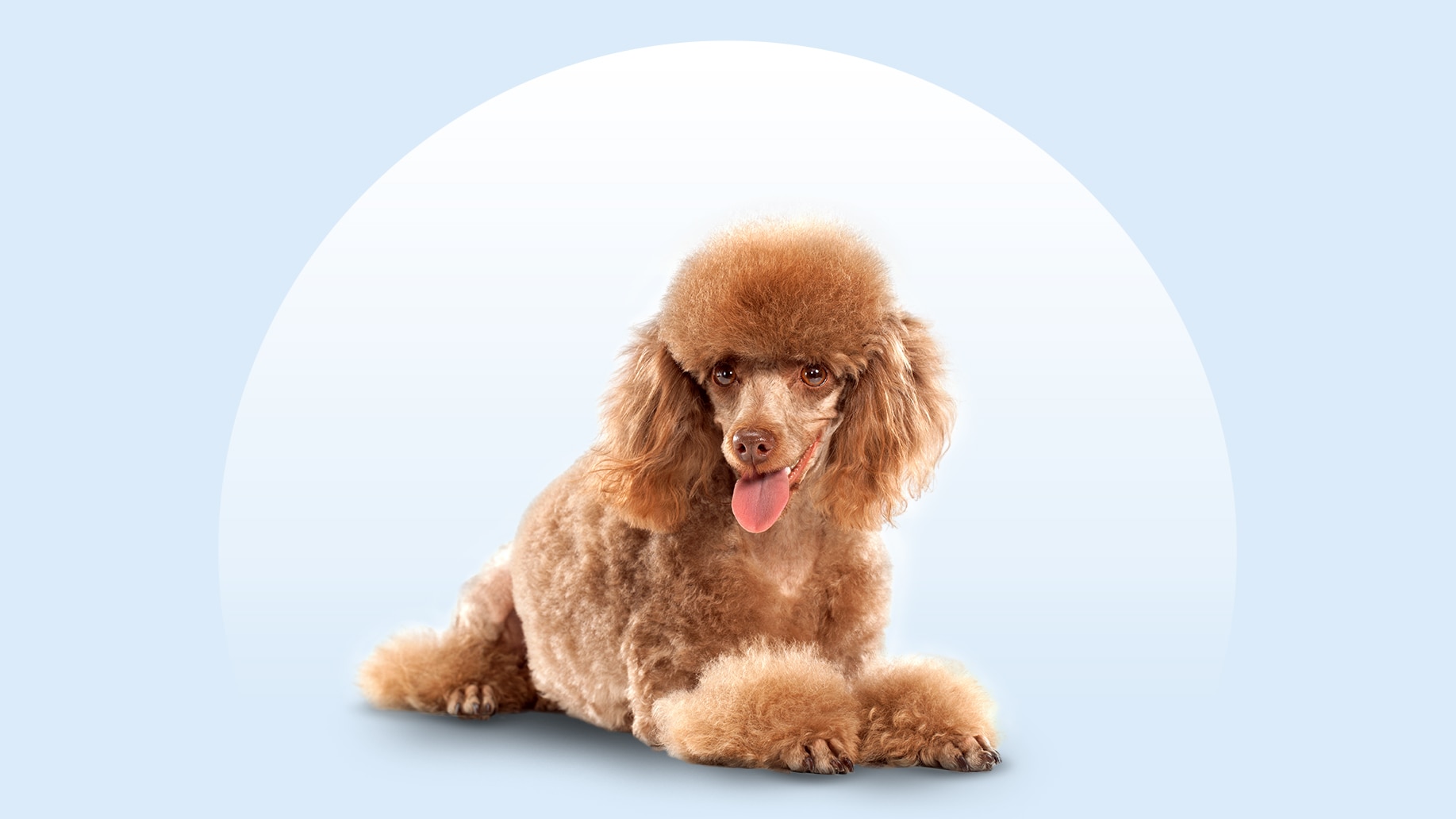Miniature Poodle
Updated May 5, 2025
Miniature Poodle
Updated May 5, 2025
Few dog breeds are as iconic as the Miniature Poodle, with their coat of curls, bright eyes, and spunky personality. The Mini Poodle is always ready to entertain you, but there’s more to them than meets the eye: They’re sharp as a tack, too.
Smarty Pants, Adaptable, Joyful
10–15 pounds
10–15 inches
10–18 years
Apricot, Black, Blue, Brown, Cream, Red, Silver, Silver Beige, White, Cafe au Lait, Gray
Whether you’re at a farmer’s market, watching TV, or hanging out at a brewery, the active Miniature Poodle is the perfect plus-one for many of life’s little adventures. And because of their small size (Miniature Poodles, full-grown, top out at about 15 pounds), they it’s easy to bring this dog along.
Another Poodle perk: While no dog is completely allergen-free, Miniature Poodles are commonly considered to be hypoallergenic dogs, who might be a good fit for pet parents with allergies.
Miniature Poodle Characteristics
Miniature Poodle Appearance
Miniature Poodles aren’t too big and aren’t too small—as the middle of the Poodle sizes, they’re just right. Falling between the tiny Toy Poodle and the large Standard Poodle, Minis stand 10–15 inches at the shoulder and weigh 10–15 pounds.
But aside from size, Miniature Poodles share a lot of the same characteristics that Toys and Standards have. They have an instantly recognizable coat of tight curls that cover the body, floppy ears, and dark but shiny eyes.

- Ears
The Miniature Poodle’s ears hang down against either side of their head and are often adorned with fringe.
- Eyes
Their eyes are oval-shaped, dark, and set wide apart.
- Nose
Their nose is dark, either black or liver (brown).
- Coat Length
Mini Poodles have dense curly hair that grows long, making regular clipping a must for maintenance.
- Coat Color
Miniature Poodles come in a wide range of colors, from apricot to black. Popular colors are gray, white, brown, red, and cream.
- Tail
The tail is carried straight and high.
Miniature Poodle Temperament
As playful social butterflies, Miniature Poodles can quickly adapt to life in a busy household. Are your weekends filled with errands? This dog is happy to join you. Do you have other pets and young kiddos at home? With proper socialization, a Miniature Poodle will be their pal.
“They love children and cats and dogs, and even enjoy watching fish swim,” says Ann Wheeler, president of the Poodle Club of Oklahoma City and an experienced Miniature Poodle breeder.
Don’t underestimate a Miniature Poodle. They need a daily schedule filled with exercise and mental stimulation to keep their brain busy and engaged—otherwise, a Mini Poodle might find creative ways to keep boredom at bay, including excessive barking or destructive behaviors like chewing up your couch cushions.
Miniature Poodles, like their Toy and Standard Poodle relatives, are also one of the smartest dog breeds on record. They have an uncanny ability to learn new tricks and can solve puzzle toys in record time. (This makes keeping them busy and engaged even more important!)
How to Care for a Miniature Poodle
Mini Poodles are cute, yes, but they (like all dogs) require grooming, training, exercise, and all other types of care. Carefully consider what this breed needs before bringing home a Miniature Poodle puppy.
Grooming
Training
Diet
Exercise
Environment
Miniature Poodle Health
The average Miniature Poodle lifespan is 10–18 years, and “living 15 or more years isn’t unusual,” says Palauskas. They’re typically a healthy dog breed, though some health conditions may pop up.
- Hip dysplasia: Mini Poodles may be susceptible to hip dysplasia, a condition where the hip’s ball and socket joint doesn’t fit together correctly, causing mobility issues and arthritis. Treatment might include medication, joint supplements, physical therapy, and (in severe cases) surgery.
- Legg-Calve-Perthes disease: Miniature Poodles can develop another hip condition called Legg-Calve-Perthes disease, which is a hereditary condition that occurs most often in young dogs. This condition causes the head of the femur (thigh bone) to die, leading the hip to become dysfunctional. It’s usually treated with surgery.
- Elbow dysplasia: Elbow dysplasia is similar to hip dysplasia, when the dog’s elbow joint doesn’t develop normally. It also leads to mobility problems and arthritis, and treatment can involve medications, weight management, and surgery.
- Progressive retinal atrophy (PRA): PRA is when the rods and cones in a dog’s eyes break down, leading to vision loss. There is no cure, but reputable Miniature Poodle breeders test their dogs for this genetic condition to avoid passing it on to their puppies.
- Patellar luxation: A luxating patella is when a dog’s kneecap slips out of place, resulting in a limp. This usually corrects itself, but severe cases may need surgery.
“A well-bred Poodle from a reputable breeder will have written documentation from a vet and the Orthopedic Foundation for Animals (OFA) of health testing completed by the puppy’s parents,” Wheeler says. “This ensures the puppy will grow up free of these problems.”
Miniature Poodle History
Miniature Poodles are a smaller version of Standard Poodles. Standards were originally bred in Germany as a smart and capable hunting companion, who readily dove into water to retrieve ducks for their humans.
According to the Poodle Club of America, Miniature Poodles and Toy Poodles were bred down from these hunting dogs to be companions. Miniature Poodles are active, smart, and maintain the “rugged” build of their Standard Poodle ancestor—just in a smaller size.










